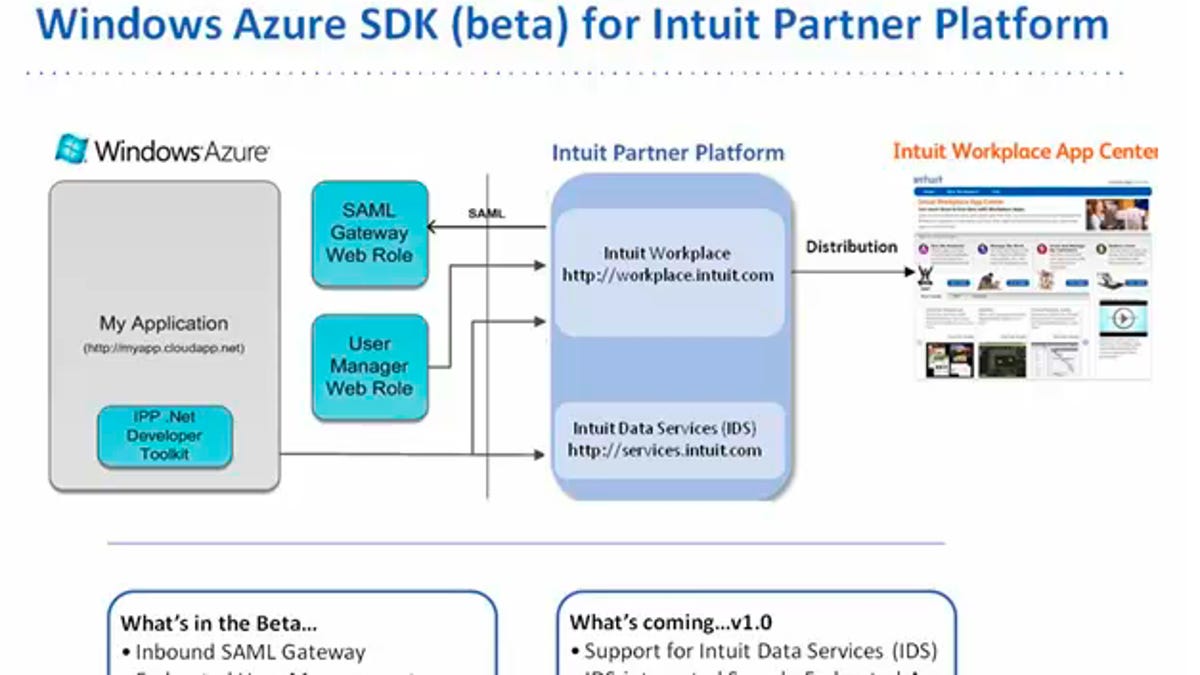Microsoft and Intuit partner up in the cloud
The two join forces to bring Quickbooks to the Azure cloud platform. Look for Microsoft to expand cloud offerings with independent software vendors in 2010.

Intuit and Microsoft announced Wednesday that the two companies plan to integrate the capabilities of their cloud services platforms, the Intuit Partner Platform (IPP) and Windows Azure platform, to build solutions for small businesses. Azure will become a "preferred platform" for small-business application development as part of the relationship.
According to Kim Akers, general manager of Partner Evangelism at Microsoft, there are three constituencies that benefit from this partnership:
- Developers working on Azure apps can take advantage of the IPP--gaining access to the features and promotion in the marketplace.
- Channel partners have a way to offer broader applications to their small-business customers.
- End customers have better access to best-of-breed and customized applications.
Akers suggests that developers have a lot to gain from this integration. "From the developer perspective you are always looking to build new and more compelling applications and channels to sell your products. With this integration developers can build richer applications much faster. Functions like billing and the marketplace function also help to make developers' lives easier with features like single sign-on."
According to Alex Chriss, director of IPP, the technology took just a few months to build because the strategy was already aligned. The integration is based on a common data model that is an extension of Quickbooks data. The data model lives in the cloud and developers are able to use the SDK to integrate between the desktop, cloud, and other applications in the ecosystem.
Microsoft has some serious motivation to get more developers on the Azure platform and Intuit's products are a logical step to more adoption. It seems likely that Microsoft will continue to take these types of smaller steps into the cloud--more partnering with independent software vendors that have developer communities--rather than jumping whole-hog into an Amazon EC2 approach. This approach ensures that Azure receives enough testing and that a developer community gets built without Microsoft having to fund the whole exercise.
Akers told me that Microsoft now better understands how customers want to interact with Azure and there are natural fits--such as this relationship with Intuit that have immediate benefits for customers. There will be more efforts on these natural-fit scenarios.
This announcement does make me wonder at what point Microsoft will consider internal or enterprise cloud deployments, which seem like a very obvious way to not only utilize the Azure technology but to provide a new deployment option that isn't tied to specific servers, but rather to a pool of resources (which ultimately can be internal or external).
For well over a year I've been suggesting that Microsoft needs to take advantage of it's massive developer base to make any real progress with Azure. While this deal with Intuit is still a bit of a baby step, there are many other applications, both online and off, that could use Azure for a variety of purposes. This bodes well not just for Microsoft but for the cloud in general.

